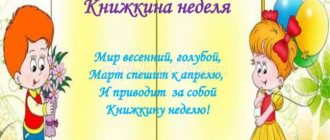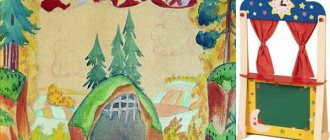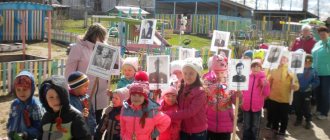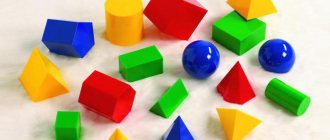“Book Week” in the senior group: planning
It is impossible to overestimate the impact that reading books has on literacy, replenishment of vocabulary, and expansion of a person’s horizons, especially in children at the preparatory stage of development.
“Book Week” at the preschool educational institution
For your information! It is easiest to develop an interest in new things in childhood, since children have the ability to vividly and sincerely experience, sympathize, rejoice, and be indignant, which manifests itself while reading a work of art.
Goals, objectives
The main goal of this project is to instill a love for reading books, teach children to respect them, and develop an interest in books through creative and educational activities.
During the implementation of this project, the following tasks are envisaged:
- To generate and maintain an interest in books and a love of reading, to cultivate a reader's taste and respect for books.
- Give children an idea of the types of books and literary genres.
- Familiarize children with all stages of book creation.
- To develop in children an understanding of the role of the writer, illustrator, and designer in the creation of a book.
- Explain to students the need and importance of libraries.
- Involve children, parents, and teachers in playing out stories from books.
Introducing kids to nature
Lexical topics
Every day of the calendar week it is planned to hold events (games, activities), presentations (speaking out abstracts and publishing notes in class) or thematic classes (communicating important information on a specific topic) on the following lexical topics:
- Monday. A walk around the native land. Acquaintance with nature through the works of writers Bianchi V.V., Prishvin M.M.
- Tuesday. Tanya, Yulechka, Petya and other heroes. Acquaintance with children's poetry through the works of Marshak S. Ya., Mikhalkov S. V., Agnia Barto, Tokmakova I. P., Mustai Karim.
- Wednesday. Travel to Buyan Island. Acquaintance with fairy tales and fables through the works of Pushkin A.S., Krylov I.A., Ushinsky K.D.
- Thursday. Walking around St. Petersburg. Acquaintance with the architecture, geography, life, climate of St. Petersburg through the poems of the poets A. A. Blok, Sasha Cherny.
- Friday. The Adventures of Bibigon. Acquaintance with the works of the writer Chukovsky K.I.
- Saturday. Dunno's friends. Acquaintance with the works of the writer N. N. Nosov.
Additional Information! Within each topic, children should be introduced to the biography and famous works of children's writers and poets, and a general description of their work should be given. Choose one of the plots in the works that most captivated the children, and role-play it with them.
Final event
The final event is that you should set aside time every day to make a book of your own composition and with drawings. At the end of Book Week, there will be an exhibition of books made by the children themselves.
Important! All events within the framework of Book Week must comply with federal state educational standards (FSES).
How to teach a 4-5 year old child to draw
Progress of the event
Main part:
Social teacher Yulia Aleksandrovna Potekhina comes to the group sites in the afternoon, when parents pick up parents from kindergarten, and addresses them with questions.
- Hello! My name is Yulia Aleksandrovna, I work as a social teacher. For a year now we have been introducing your children to human rights and their responsibilities. From March 25 to 28, Children's Book Week was held in the kindergarten. And from April 3 and 4 in our kindergarten we are holding a lottery for parents of preschool educational institutions on the topic “Artworks and Human Rights”, the purpose of which is to show the importance and significance of the legal direction in the social pedagogy of preschool educational institutions for parents of preparatory groups.
— Do you want to take part in the lottery called “Artworks and Human Rights”? Have you read the announcement? (Appendix No. 1) Are you familiar with the rules?
- No.
- Okay, now I’ll remind you of the rules.
The lottery is free. Lottery participants draw tickets (Appendix No. 2). Participants answer questions by drawing a lottery ticket. Starting only from the first level - this is the question that is on the yellow ticket. After answering the first question, the participant takes the second and third tickets. You can answer only one question of each level, no more. The participant who answers correctly receives a prize. Namely:
- the first level receives a pen;
- second level – corner folder;
- third level - a book from the series “We read for ourselves, we read for mom.”
The participant who gave the wrong answer must name and write down on the sheet of incorrect answers a favorite book or work that his child likes to listen to, leaf through, and look at (Appendix No. 3).
- Tonight you will definitely read this book that you won in our lottery.
— Dear parents! We pull out pieces of paper with questions and answer them. For the correct answer you receive a book for your child. We answer questions, take your time, think carefully about your answer.
— Thank you for participating in the lottery.
Awarding prizes. Conducting a sociological survey on the topic of the event.
Social survey questions after answers to lottery questions (Appendix No. 6) and answers to sociological survey questions, with percentages (Appendix 7).
After the lottery:
The lottery is held by a social teacher with parents of children in pre-school groups. Dads, mothers and grandmothers, in the amount of 20 people, took part in the lottery. 15 people answered all the lottery questions correctly:
- for the first question – 15 people,
- for the second – 18 people,
- for the third – 20 people.
Incorrect answers: 7.
Wanted to take part in a similar kindergarten event: 19 people - 95% of respondents.
Appendix No. 2
First level:
- What is the name of the main document on the rights of the child adopted at the 44th session of the UN General Assembly? (Convention on the Rights of the Child)
- In what year was the Convention on the Rights of the Child adopted? (1989)
- How many articles does the Convention on the Rights of the Child include? (54)
- In what year did Russia ratify the Convention on the Rights of the Child? (1990)
- In what year was the Universal Declaration of Human Rights adopted? (1948)
- At what age is a person considered a child, according to the UN? (0-18 years)
- To whom does the Convention give primary responsibility for raising a child? (for parents)
- Name the Polish writer who published the book “The Child’s Right to Respect” in 1929? (Janusz Korczak)
- Is raising a child a right or a responsibility of parents? (Both right and duty)
- Who owns the words that “the happiness of the whole world is not worth one tear on the cheek of an innocent child”? (F.M. Dostoevsky)
- Who is responsible for raising a child if the parents divorce? (Both parents)
Second level:
- Why did the inhabitants of the courtyard in Andersen's fairy tale "The Ugly Duckling" offend the ugly duckling? (He was not like the others.)
- Who violated the right to inviolability of home in the fairy tale “Zayushkina’s Hut”, and who helped the hare restore his rights? (Fox, Rooster)
- How far could the frog move using its right to freedom of movement? (No limits)
- What crime did the geese-swans commit in the fairy tale of the same name by stealing their brother? (Child abduction)
- What are the fairy tales in which the right to work was violated? (“Cinderella”, “Moroz Ivanovich”, “Thumbelina”)
- Do you think a child has a right to his opinion? (Yes, sure)
- What is the name of the profession of a person who exercises the right to medical care? (Doctor)
- What do you know about your name? (Name designation and translation)
- In which fairy tales is the right to privacy of home violated? Name them. (“Three Bears”, “Three Little Pigs”, “Zayushkina’s Hut”, “Little Red Riding Hood”)
- Name the correct fairy tale in which a talking cricket invites Pinocchio to exercise his right to education? (The Golden Key or The Adventures of Pinocchio)
Third level:
- Determine what rights were violated in the following cases: a child was given contaminated blood in a hospital. (Right to life, art. 6)
- The neighbor on the desk read a note addressed to another student. (Right to privacy of correspondence)
- What right did the witch violate in the fairy tale “Sister Alyonushka and Brother Ivanushka”? (The right to live)
- What right did the animals violate in the fairy tale “Kolobok” when they tried to eat the main character of the fairy tale? (The right to live)
- What right was violated by the Wolf in the fairy tale “Little Red Riding Hood” in relation to the grandmother (Right to life and right to inviolability of home). What about Little Red Riding Hood? (The right to live)
- What right was violated in the fairy tale “Zayushkina’s Hut”? (Right to inviolability of home)
- What rights did the brothers violate in the fairy tale “Ivan Tsarevich and the Gray Wolf”? (The right to live)
- What right did the talking Cricket advise Pinocchio to exercise in A. Tolstoy’s fairy tale “The Golden Key”? (Right to education)
- What right did Buratino violate by grabbing the rat Shushera by the tail? (The right to live)
- Why can't you give your comrades nicknames? (The right to the name is violated)
Little book from old magazines
This is a very simple and interesting idea for a baby book that you can bring to life with your child. Let your child choose a topic, cut out pictures and place them on the page. This book is fun not only to read, but also to make, and then share with friends!
Photo: infourok.ru
You will need:
Old colorful books and magazines, scissors, paper, glue, pencils, thread and needle, tape.
How to do:
Decide on the size of the future baby book, the number of pages and the topic - for example, it could be animals and plants. Divide the cut-out illustrations into groups: wild animals, domestic animals, fish, birds, and so on.
For the cover, take thick sheets of cardboard, make the pages out of paper and sew them with thick strong thread. Inside you can leave inserts of entire magazine pages with educational information. This way, children will be able to learn more about those animals that were previously cut out and pasted on.
Baby book on rings
Tactile sensations are the most important life stage for all children, so baby books need appropriate ones. Use large details, expressive textures, bright colors and different materials. Connect individual pages into large rings or ties.
Photo: cdo21.ru
You will need:
Colored cardboard, scissors, hole punch and rings, glue, stapler, colored fabric, all kinds of fillers and tape.
How to do:
Fold a sheet of cardboard in half, glue it and use a hole punch to make holes in the middle for stitching - these will be your pages. Later you can assemble them onto split rings. This way the baby book will be convenient to store, nothing will get lost, but the child will be able to study each sheet separately.
Glue bubble wrap, lace, corrugated paper or some other material with an unusual texture onto double-sided tape. Use tassels, fringe, small knitted toys and decorations, balloons, ribbons, pom-poms, feathers - whatever you find!
Baby book made from A4 paper
Little baby books are great for learning the basics of reading. They are cheerful and funny, there is nothing superfluous in them, and the child perceives such leisure time as an exciting game. And such pocket books are always convenient to take with you on trips and travels!
Photo: pinterest.ru
You will need:
A4 paper, a stationery knife, glue, colored pencils, markers, pens and crayons.
How to do:
Fold a sheet of A4 paper in half lengthwise, then again crosswise, and again each half. Unfold it and make a cut in the middle with a utility knife. Coat one side with glue along the entire plane and fold the book, fixing the pages.
You can combine several of these paper blocks into one thicker book and even make a cover. All that remains is to draw pictures and write text. They can be used to study the seasons, animals, surrounding objects, numbers - anything!
Making a baby book with your child
Sometimes children even get bored with cute felt bunnies and rattles, but they love to create and come up with new ideas themselves. Choose a theme for a baby book together, draw, collect interesting facts, use pictures and stickers!
Photo: connecticum-dou.ru
You will need:
Paper, glue, paints and pencils, old magazines and printouts, stickers, needle and thread.
How to do:
Instead of making fabric pages or printing out backgrounds, design them yourself! For example, to make a book about animals, first draw their habitats. To do this, fold sheets of A4 paper in half and hand them to your child along with the pictures - let the child choose the animals he wants to live there, while you find something interesting about them.
Older children can fill out the text in the baby book themselves - at the same time this will be a short training in their writing skills. All that remains is to stick all the animals onto your pages and sew the book in the middle with regular thick thread.
Did you like the post? Subscribe to our channel in Yandex.Zen, it really helps us in our development!
Appendix No. 1
"Announcement text"
Dear parents! Attention! Free lottery!
From March 25 to 28, Children's Book Week was held in the kindergarten. On April 3 and 4, our kindergarten will organize a lottery for parents of preschool educational institutions on the topic “Artworks and Human Rights”
Lottery rules.
- Participation in the lottery is free.
- All interested parents become participants.
- Participants answer questions by drawing a lottery ticket. Starting only from the first level - this is the question that is on the yellow ticket. After answering the first question, the participant takes the second and third tickets.
- You can answer only one question of each level, no more.
- The participant who answers correctly receives prizes. Namely: the first level receives a pen; second level – corner folder; third level - a book from the series “We read for ourselves, we read for mom.”
- A participant who answers the lottery questions incorrectly must name and write down on the sheet “Didn’t answer the question - write the title of the work” a favorite book or work that the child likes to listen to, leaf through, or look at.
Administration.
For middle preschool age
The little book (you can make it quite quickly with your own hands) can also be adapted for children of middle preschool age. This is 4-5 years. For older children, you need to spend more time filling and decorating the product. They can quickly get bored with a simple little book without surprises or secrets.
Topics and content
For children 4-5 years old, you can also make baby books on the theme of fairy tales and cartoons. But these should already be works adapted for older ages. For example, already cartoon series, stories about superheroes, princesses. A book on the theme of Disney characters would be interesting. These could be princes or princesses, animals and insects, birds and sea creatures.
If the books are thematic, an excellent option would be to cut them out in unusual shapes. For example, in the form of vegetables, fruits, sweets, fairy tale and cartoon characters.
At 4-5 years old, you can begin to gradually learn letters and numbers. It is also important to make little books on these topics. For example, dedicate one of them to the alphabet. To prevent the book from getting too big, you can divide it into several parts at once. Dedicate the first only to vowels, the second to consonants.
An interesting option is to make a book about letters that the baby cannot pronounce. You will need to contact a speech therapist for help in this process. This is especially easy to do in kindergarten. Then it will be easier and more interesting to work with problematic letters and sounds. Speech therapy lessons can be turned into a game.
You can make a separate booklet for each letter. For example, dedicate the first one to the letter A. Inside, publish words for this letter, funny stories about it, riddles, poems and other similar material. An interesting option is to invite the child to come up with a fairy tale about A himself, and leave hints on the pages of the book on how to do it easier.
If the product is created personally for a child, its main theme can be a favorite movie, fairy tale, cartoon, boy or girl character. The resulting book will be an excellent gift option. If a child has a favorite character, it will be important to tell as much information about him as possible on its pages. For example, the history of creation, everything about his family. Or even come up with new adventures of your favorite character yourself.
Selection of texts
The longest process when creating such a book is the selection of texts.
They must meet several requirements at once:
- be suitable for age;
- fit the topic;
- fit in size.
You should not use too long texts. It is difficult to fit them on the pages of a small book. We have to greatly reduce the font. Then the texts do not look very attractive and it becomes difficult to read them.
A variety of fairy tales, proverbs and sayings are well suited for children's books. You can dilute the texts with short riddles and jokes. With 4-5 year old children it is interesting to compose texts for the product together.
For example, invent stories, comics, fairy tales. If the theme of the book is a child’s favorite character, you should invite the boy or girl to independently come up with a continuation of his adventures. A parent or teacher can do the same. Then the product will become a real surprise gift for the little reader.
Today, on the Internet, you can find most of the popular fairy tales, stories, and proverbs. It is convenient to collect them together, arrange them on a sheet of paper in several lines and print them out. You can even do this in the form of “bubbles”-conversations based on the comic book principle. Then the texts can be combined with the characters of the book. It is they who will ask questions to the reader, “communicate” with him in the process of reading and studying.
A selection of pictures
The easiest option is to simply buy or print sheets of stickers that match the theme. This trick will significantly speed up the process of designing a booklet. Let the stickers be large at once - the basis of some pages and small ones (they are suitable for decoration, additions). You just need to choose suitable places for the pictures on the pages of a miniature book and carefully stick them on. You can do this together with your child.
Another simple option is to cut up an old magazine and use postcards. Today in stores you can find printed materials on various topics.
If possible, the necessary pictures can be printed in a printing house. Photographs are also suitable for decorating baby books on certain topics. For example, if the product tells about life in a kindergarten, about a child’s home, about the region, the city in which he lives. True, photographs will have to be taken in a reduced format rather than a standard format. And preferably on thinner paper.
Decor
When designing a baby book, you should use your imagination. You can experiment with the shape, the product, the number of pages in it, and decorations.
When making a book you should:
- Choose its shape. It could be a silhouette of your favorite character, a flower, a leaf, a vegetable, a fruit, a heart.
- Select the material that will fill the book. Print the necessary texts and pictures, cut them out.
- Glue the parts of the product prepared in the last step onto its pages.
- Design the book with felt-tip pens or pencils. If the artist does not have artistic skills, you can use stickers and ready-made applications.
It is important to carefully secure all parts of the product. This is done using tape, tape, and thread. At 4-5 years old, children are at their most active and are unlikely to carefully flip through the pages of a product. Therefore, you should protect it from rapid deterioration in every possible way.
How to use
A handmade baby book can be used for games and activities. It all depends on its main topic. If this is a speech therapy option, it can be used for classes with a specialist.
The finished product is convenient to take with you on a long journey. Then the child will be able to study the book for a while, forgetting about boredom. You will get both useful activities and entertainment at once.
The book can be used many times. If the child has already become tired of it, it is worth removing the product from his eyes for a while. And then start working with him again.






